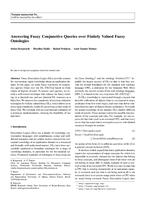Article3020: Unterschied zwischen den Versionen
Aus International Center for Computational Logic
Stefan Borgwardt (Diskussion | Beiträge) (Die Seite wurde neu angelegt: „{{Publikation Erster Autor |ErsterAutorVorname=Stefan |ErsterAutorNachname=Borgwardt |FurtherAuthors=Theofilos Mailis; Rafael Peñaloza; Anni-Yasmin Turhan }}…“) |
Stefan Borgwardt (Diskussion | Beiträge) Keine Bearbeitungszusammenfassung |
||
| (Eine dazwischenliegende Version von einem anderen Benutzer wird nicht angezeigt) | |||
| Zeile 7: | Zeile 7: | ||
|Referiert=1 | |Referiert=1 | ||
|Title=Answering Fuzzy Conjunctive Queries over Finitely Valued Fuzzy Ontologies | |Title=Answering Fuzzy Conjunctive Queries over Finitely Valued Fuzzy Ontologies | ||
|To appear= | |To appear=0 | ||
|Year=2016 | |Year=2016 | ||
|Journal=Journal on Data Semantics | |Journal=Journal on Data Semantics | ||
|Volume=5 | |||
|Number=2 | |||
|Pages=55–75 | |||
}} | }} | ||
{{Publikation Details | {{Publikation Details | ||
|Abstract=Fuzzy Description Logics (DLs) provide a means for representing vague knowledge about an application domain. In this paper, we study fuzzy extensions of conjunctive queries (CQs) over the DL SROIQ based on finite chains of degrees of truth. To answer such queries, we extend a well-known technique that reduces the fuzzy ontology to a classical one, and use classical DL reasoners as a black box. We improve the complexity of previous reduction techniques for finitely valued fuzzy DLs, which allows us to prove tight complexity results for answering certain kinds of fuzzy CQs. We conclude with an experimental evaluation of a prototype implementation, showing the feasibility of our approach. | |Abstract=Fuzzy Description Logics (DLs) provide a means for representing vague knowledge about an application domain. In this paper, we study fuzzy extensions of conjunctive queries (CQs) over the DL SROIQ based on finite chains of degrees of truth. To answer such queries, we extend a well-known technique that reduces the fuzzy ontology to a classical one, and use classical DL reasoners as a black box. We improve the complexity of previous reduction techniques for finitely valued fuzzy DLs, which allows us to prove tight complexity results for answering certain kinds of fuzzy CQs. We conclude with an experimental evaluation of a prototype implementation, showing the feasibility of our approach. | ||
|Download=BMPT-JoDS16.pdf | |Download=BMPT-JoDS16.pdf | ||
|DOI Name=10.1007/s13740-015-0055-y | |DOI Name=10.1007/s13740-015-0055-y | ||
|Projekt=HAEC | |Projekt=HAEC B02 | ||
|Forschungsgruppe=Automatentheorie | |Forschungsgruppe=Automatentheorie | ||
}} | }} | ||
Aktuelle Version vom 24. Mai 2016, 09:57 Uhr
Answering Fuzzy Conjunctive Queries over Finitely Valued Fuzzy Ontologies
Stefan BorgwardtStefan Borgwardt, Theofilos MailisTheofilos Mailis, Rafael PeñalozaRafael Peñaloza, Anni-Yasmin TurhanAnni-Yasmin Turhan
Stefan Borgwardt, Theofilos Mailis, Rafael Peñaloza, Anni-Yasmin Turhan
Answering Fuzzy Conjunctive Queries over Finitely Valued Fuzzy Ontologies
Journal on Data Semantics, 5(2):55–75, 2016
Answering Fuzzy Conjunctive Queries over Finitely Valued Fuzzy Ontologies
Journal on Data Semantics, 5(2):55–75, 2016
- KurzfassungAbstract
Fuzzy Description Logics (DLs) provide a means for representing vague knowledge about an application domain. In this paper, we study fuzzy extensions of conjunctive queries (CQs) over the DL SROIQ based on finite chains of degrees of truth. To answer such queries, we extend a well-known technique that reduces the fuzzy ontology to a classical one, and use classical DL reasoners as a black box. We improve the complexity of previous reduction techniques for finitely valued fuzzy DLs, which allows us to prove tight complexity results for answering certain kinds of fuzzy CQs. We conclude with an experimental evaluation of a prototype implementation, showing the feasibility of our approach. - Projekt:Project: HAEC B02
- Forschungsgruppe:Research Group: AutomatentheorieAutomata Theory
@article{BMPT2016,
author = {Stefan Borgwardt and Theofilos Mailis and Rafael Pe{\~{n}}aloza and
Anni-Yasmin Turhan},
title = {Answering Fuzzy Conjunctive Queries over Finitely Valued Fuzzy
Ontologies},
journal = {Journal on Data Semantics},
volume = {5},
number = {2},
year = {2016},
pages = {55{\textendash}75},
doi = {10.1007/s13740-015-0055-y}
}
